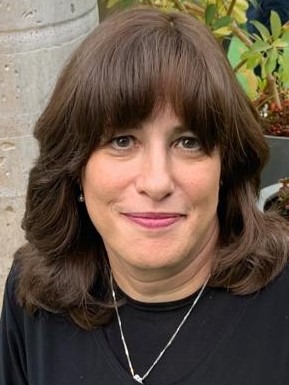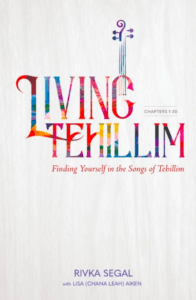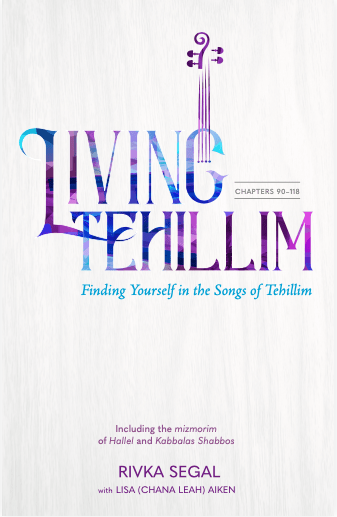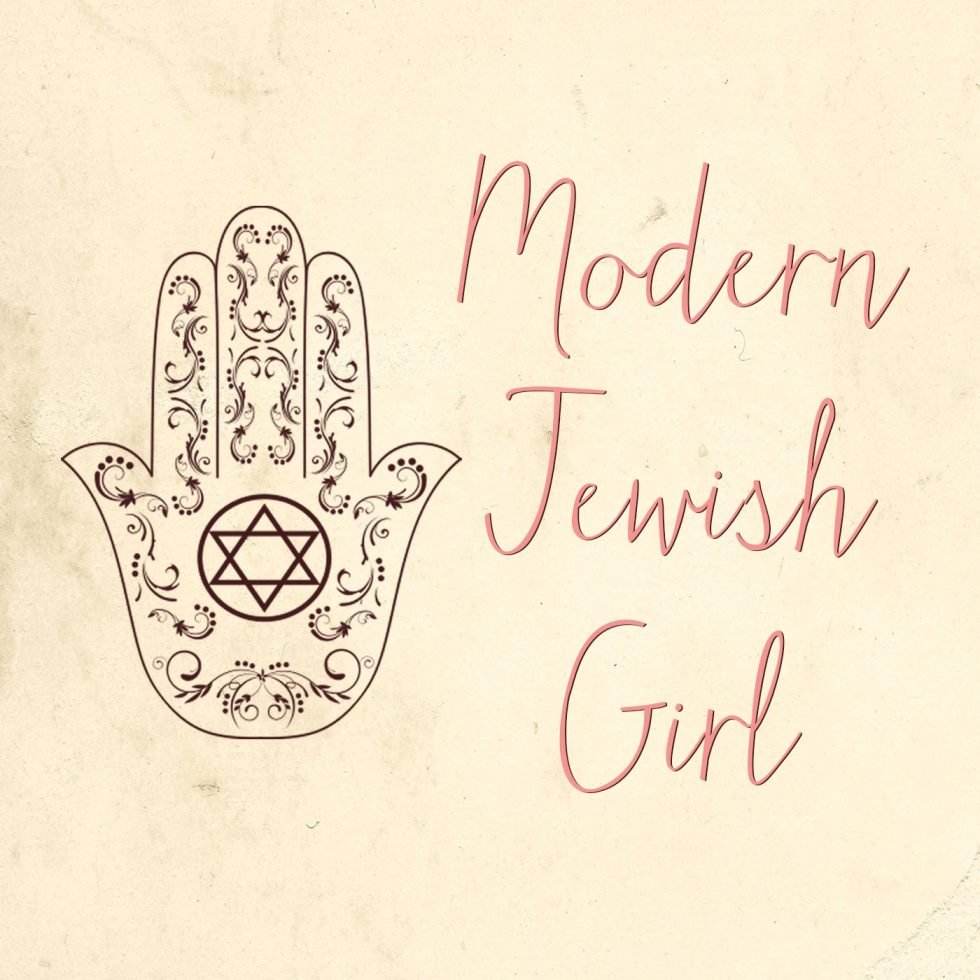Tehillim is one of those things we want to feel. Psalms are a powerful resource and gateway for prayer. We say them at moments of utmost simcha—like a wedding or brit milah—and also in times of real desperation—like when someone needs a refua (recovery from illness).

Saying Tehillim is one of those things you may feel like you’re “supposed” to really connect to, and if you don’t, you might just be a bit embarrassed to admit it. That’s where Rivka Segal comes in. She also felt distant from Tehillim, believe it or not. A teacher from Baltimore, Maryland, she made aliyah with her family 15 years ago and when looking for a job, found one as a Tehillim teacher. She started digging into the book of Psalms out of necessity — and came out with a new love for its words. Now, Tehillim is her life’s work.
She continues to teach women in Eretz Yisrael and released a book called Living Tehillim with her colleague (and student) Lisa Aiken. The two transformed her classes to text so a wider audience can learn from her lessons. The first book talks about psalms 1-30, and the second just came out which includes 90-118 (she jumped to these since they’re more commonly found in daily prayers). The text of Tehillim is so powerful, it’s a shame to miss out on the impact it can make. We sat down with Rivka to glean some of that magic for ourselves.
—
Let’s dive right in. Why is saying Tehillim so powerful?
To start, Tehillim is the most awesome self-help book. It’s so incredible. It will help you learn about yourself, give you tools to make it through the day and navigate your relationships. People can utilize the psalms to grow and become better, stronger people. Tehillim is not just something you say, it’s something you do. You say it when you want someone to get better, for example, but it’s got to transform you as well. Every passuk (verse) is a tool that teaches you how you should treat others in life or how you should treat yourself.
The Hebrew words themselves are powerful. Sometimes you’ll have Tehillim groups where people sit and say the whole book three, four or five times. It’s a good thing, because the words definitely do something, but sometimes people leave and have no idea what they just did. It’s important to focus on the meaning of the Tehillim. Learning about those feelings will help you have more kavanna (intention) in your prayer, and in turn, get closer to G-d.
“Tehillim is not just something you say, it’s something you do.”
Rivka Segal
When you say a passuk, you are saying the same thing that Dovid Hamelech said. It’s something that’s worked for generations. Connecting to that is a feeling you can’t describe. It creates a spiritual excitement inside of you. It’s a spark that transforms you and connects you to G-d, and when that happens, your transformation becomes a zechut (merit) to bring good into the world. The spark you feel creates an energy in the world, which G-d then uses to change reality. Hopefully He uses it to protect the person we’re davening for. Ultimately, G-d changes everything but He uses our tools. That positive energy is so powerful, and we have to bring it out.
How can someone work on creating more of that connection?

When you’re reading Tehillim, sometimes a sentence stands out to you. When that happens, take a sticky note and put it right in that spot. It’s a message for you. It’s meaningful because it goes into your being and transforms you—you feel a spark and feel more connected to Hashem in that moment. You might get strength or feel some sort of direction. Maybe you’ve been struggling with a relationship and you don’t know what to say to that person. All of a sudden, that passuk will give you answers or describe how you feel.
Through the pesukim, you see how Dovid handled his life. You also see that he talked to G-d when he had an issue. He didn’t just go write a blog putting someone else down. Each passuk tells you something. Sometimes it’s about doing chessed, other times it’s just not being afraid. Perek gimmel (the third psalm), for example, is said at night when we go to sleep. We say, “I’m going to lie down and go to sleep because I know G-d is with me.” It gives you faith.
The thing is, everything that has meaning in life takes work. You can’t just say you want to connect more to Tehillim — you have to work through the Tehillim. Ask yourself — what is this passuk telling me to do? What am I asking G-d for right now? How am I using Tehillim to strengthen my relationship with G-d?
If you’re having trouble connecting — and I felt this way at the beginning as well — then you’re not taking the time to feel what the tone of the song is. Pay attention to how you feel when you’re reading it. Are you in a place of sadness or happiness? The pesukim are affirmations.
That’s so interesting. Can you talk more about how you can use Tehillim to affirm yourself?
Nowadays we have mantras. A lot of self-help speakers say, “meditate, meditate, meditate.” But what does it mean to meditate? What does it mean to pick one verse and say it again and again? That’s Tehillim. These are the verses to meditate on in your life and say over and over.
I think the Christians have it. They’re doing that. There are people who say it, but it doesn’t come out in the public as much to use the pesukim of Tehillim as affirmations. Sometimes, you are saying a bunch of Tehillim that you just have to get through and you do it without thinking. That’s where the sticky note comes in. If something resonates with you but you don’t have time to think about it, put a note in and come back to it later. Say it in half an hour, say it before you go to sleep and when you wake up in the morning. It will change your life and give you strength. It really works.
What are other exercises you can do to connect more?
Try and think about the song from different angles. If it were a piece of music, ask if it’s a fast piece or a slow piece. If you were to draw a picture of the psalm, would it be red? Blue? Green? Is this a song that’s all about G-d or all about me? There are both. Or maybe it’s G-d and me having a dialogue with each other. Think about where G-d is in the song and where I am.
I went through the Tehillim and wanted to figure out how many of the pesukim are literally a tefillah (prayer). I would say maybe 60-70% are me talking to G-d. A lot of the Tehillim are me talking to myself or where G-d is talking to me.
Take one passuk and say it 25 times throughout the day. Stop and think: Am I saying this with meaning? Am I just saying, “I love you,” or do I really feel it? If you’re not in a place of love, that’s okay, you’re not feeling that today.
“[Tehillim] will change your life and give you strength.”
Rivka Segal
Once you nail down those emotions a bit further, what do you do with them? How can you bring them into your Tehillim practice?
You can start to identify different Tehillim that fit different mindsets and emotions. Psalm 59, for example, is all about victim mentality. Hopefully, it’s not your go-to song, but sometimes we might feel that sense of victim mentality and when you do, say this one. You can find a song that fits with you.
Emotions change. That’s why there are 150 Tehillim and not just one. It depends on where you’re at today, which Tehillim you need to sing. As you get more familiar with them, you’ll start to know where to turn, what you need, and how to find that magic again.
I remember the day we took my son to the bus when he was going off to the army. We were standing there saying goodbye with wives, other parents, crying mothers. They only let family members go to a certain point. It reminded me of perek 27 (chapter 27) when it says, “My mother and father left me, but G-d has brought me in.” I always thought that meant your parents had died and there’s no one left. But there we were vibrant and alive, baruch Hashem. At that moment, though, he was leaving. We couldn’t hold onto him; we couldn’t give him a sandwich or take care of him. I just thought, “Okay G-d, he’s all Yours.” So that was the passuk for the day. There’s a passuk for everything when you know where to find it.
How can someone get started if they’re a newbie?
Honestly, you should just start. At the beginning, it might seem like you’re not doing anything and it’s just a bunch of words, but it’s still worth it. You’ll start to get familiar with the words and the longer you do that, the more comfortable you get.
It’s also important to remember that when you are praying for someone, and a line stands out to you, and brings clarity about something in your life, any decision you make because of that, whether it’s deciding to do a mitzvah or not speaking lashon hara, is then in the zechut of your friend. That energy is eternal.
It’s like when we pray every day and talk about Avraham, Yitzchak and Yaakov. We say, “G-d, I am the daughter of these Avot (forefathers). If not for me, do it for them.” We remind G-d of their greatness and their actions inspire G-d to give us a better day.
Is it okay to say it in English or your native language? Do you have to say them in Hebrew?

The Hebrew letters themselves are very powerful. If you take two hydrogens and an oxygen, you get water. In Hebrew, the letters themselves are like the periodic table of elements. When a word is written with certain letters, those letters are the word. You’re not just identifying the emotion, it is the emotion. So, there’s a real power to the letters, but you have to say the words correctly, clearly and carefully. Once you say that word, it’s out there in the universe and it brings things into the world through the alef-bet (alphabet).
That being said, the idea of saying Tehillim transforms you. If it will make a bigger impact on you to say it in your native language, you should do that. If you say it in Hebrew without knowing what it means, you’re missing a connection to G-d. Of course, just talking to G-d at all can be powerful, so it’s not black-and-white, but if you don’t know Hebrew well, you can say it in any language. There are also interlinear Tehillim editions that have the English translation directly below the Hebrew so you can say it while learning what the words mean.
Why does it help to say Tehillim for another person?
Anything you do for someone else counts. Maybe a friend is struggling with shidduchim (dating). You may not be able to find a date for them or get them married, but you can daven. There’s an energy of “I want to do for someone else,” and that’s a positive thing that you’re putting out into the world. Nothing is worthless.
It’s even better if you can maximize what you’re doing. Just saying Tehillim without meaning is like having a computer and using it just for email. It’s really nice, but there’s so much more you could do with it.
Ultimately, though, whenever you do a mitzvah, whether it’s a very personal one no one knows about or an overt, public one, you’re creating a powerful force in the world. There are so many midrashim (textual interpretations) that back this up. Because you do those things, Hashem has “vaccines,” so to speak, and He can use them to bring good to Borough Park at that moment, for example. Hashem says, “I want to bring refua to this person, but I need the tools. Where is my medicine?”
The medicine He uses is all of the mitzvot people do. We don’t see this. We wonder what happened to the fact that I didn’t say lashon hara that day. No one acknowledged it, I didn’t see how it helped me. But everything we do makes an impact. Hashem is still using the good things Avraham Avinu did thousands of years ago. The points don’t get used up. Saying Tehillim helps you make right decisions, which help take care of this person and possibly millions of other people in the present or future.
Is there a prayer you’re supposed to say before or after you say your Tehillim? Is that important?
The prayer before and after is there to help you focus on what you just did. You could say, “I’m taking half an hour to say Tehillim because I really love my friend and want her to have a refua sheleima (full recovery) or I really want to make sure their community is healthy.” You should talk it out in your mind and be so clear what your goal is from the Tehillim. You could say, “Please Hashem, help me put the right words in my mouth to say, please help me concentrate on this.” I ask for those things beforehand.
Should we be creating a goal to say a certain amount of Tehillim in a certain time? Some people say the whole book every week or month, but sometimes that can create pressure.
It really depends on who you are. Everyone has their goal. Some people work on learning one chapter of Tehillim each month so they can really integrate it into their lives. Some journal based on Tehillim. People who say Tehillim all the time, they’re incredible, but that doesn’t have to be you. If someone says, “I bake 25 cakes every day and I give it out to all the neighbors,” that’s really nice but that doesn’t mean you have to do that.
You want to connect to Tehillim because it’s the easiest way to connect to G-d if you know what you’re talking about. Once you learn it, you’re going to want to say it. There might be a case where there’s a desperate need to say Tehilim today. You might not ordinarily say it, but you do it because there’s a great need. But that doesn’t mean you’re going to be doing that every day. You may have times where you say more than you’re comfortable with and for the moment, that’s the right thing. It’s got to be something you figure out for yourself, though. You don’t have to be afraid of Tehillim. You can ask questions and speak it out. It’s yours.
For shiurim (Torah classes) and more wisdom from Rivka, visit her website, livingtehillim.com.










[…] “I am enough.” Or “Hashem loves me.” Meditating on something you really need at the moment can give you a boost that lasts way longer than a […]
I have always heard the word Tehillim and knew they were prayers. I didn’t know that they were prayers recited to make the world a better place, so to speak. Since the war began someone mentioned that they were saying Tehillim and showed me “the way”. Since I’ve started reading them, in English, I have no idea how what is written relates to the war and protecting soldiers and Israel. I don’t know what the verses really mean. How do I learn that?
Thank you for your comment. Any perek, or chapter, of Tehillim you say can go toward the war effort and is powerful. They say 20, 79, 80, 83, 121, 130, 142 are particularly pertinent when Israel or Jews are in danger. In terms of what the verses mean, try and look at the words. So many I’ve read during this speak about our enemies, how not to be afraid, that G-d is with us. Sometimes, it feels like old English and even the language we understand doesn’t make sense — I totally get what you’re saying! But as you get more into it, as you look at the lines more closely, it’s all right there. The text is soothing in itself and you’re changing yourself as you read. Kol ha kavod at taking this on. Even if you don’t fully understand it, it has power. Keep fighting.
I also pray Psm 22,27 and 121. May peace reign over Israel 🇮🇱 🙏
Since the war, I joined a tehillim group. Sometimes, I get lost in the text and it seems it doesn’t relate exactly to the war or the soldiers etc. And then I realize , it’s for me! Hashem was speaking right to me Thank you so much for this article. It put it all into perspective!
Hola he leido y me parese muy interesante todo lo que as dicho de los tehilim, me gustaria me compartieras algunos tehilim de sanidad ya q estoy pasando por enfermedad en mis huesos Hashem te bendiga siempre.
soluta quisquam harum ut accusantium velit ea odit veniam consequatur distinctio corporis consectetur tempora perferendis. consectetur ipsum tempore velit quo adipisci maxime. recusandae iure itaque neque vel deserunt accusamus ipsum repudiandae esse consequatur provident fuga.
facilis laboriosam est itaque illo modi suscipit laboriosam deserunt amet doloremque recusandae. perspiciatis quisquam dolor et dolorem officiis repudiandae assumenda rerum eaque.
[…] interviewed Rivka nearly four years ago for the Chai on Life website and the article we did together continues to be the top performing article today. I think it’s because people are […]